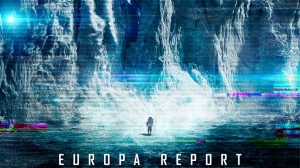Strength in the Face of Cosmic Odds:
Europa Report
(2013)

Director: Sebastian Cordero
Screenplay: Philip Gelat
Music: Bear McCreary
Cinematography: Enrique Chediak
Starring: Christian Camargo, Sharlto Copley, Anamaria Marinca, Michael Nyqvist, Embeth Davidz, Daniel Wu and Karolina Wydra
Most of Europa Report is too close to the very core of why I’ve had a lifelong love of the science-fiction genre for me to be in any way very objective. Despite being done in a low-key manner and in the style of a documentary, it elicits that sense of awe and wonder at the vastness of the universe that has always fired my imagination. The irony is that it captures that feeling so well despite almost all of the action taking place inside the Europa One space craft.
Dr. Unger (Davidz) tells the story of this epic voyage of discovery through the device of ‘found footage’ that became so popular after the inexplicable success of the awful Blair Witch Project. Mercifully it is there that the resemblance to that steaming pile of horse manure ends, and we soon become immersed in the minutia of the day-to-day life of the six astronauts aboard the craft; and the Ecuadorian director Cordero, in his first English-language film makes the science sound convincing whilst never letting it swamp the audience.
In 2011 (and in reality) liquid has been discovered beneath the ice surface of Europa, one of the moons of Jupiter, pointing to the possibility of life there. Europa, indeed, is rather beloved of S F writers, as in Peter Hyams’s 2010, the fine sequel to Stanley Kubrick’s 2001: A Space Odyssey. And considering the debt of gratitude that the genre owes the latter film it is no surprise that it is referenced briefly in Europa Report with a short blast of the Blue Danube Waltz. It took a while for it to hit me that the ensuing mission to confirm life there takes place in our own time, giving the film—for me at least—a rather odd, but satisfying feel to it. There is a wonderful moment that gives us some sense of the immensity of space when Unger says:
“As the ship passed the moon, it had already gone farther than any human being had ever travelled before. Think about that: across all of human history that moment was the farthest anyone had ever gone, but they still had millions upon millions of miles to go.”
That kind of thing just gives me the shivers. In fact it may be one of the reasons that I’ve always found H.P. Lovecraft, when at his most cosmic, to be so effective. He captures not only the utter enormity of the universe, but even more importantly its complete indifference to us or any other species.
It has already been established at the beginning of the film that not all six of the astronauts make it, but Europa is indeed reached. And here begins a mystery that may not endear all of the audience but left me quite happy, despite a running time that perhaps could have been trimmed just slightly. Their problems begin with their projected landing area being compromised:
“We flew 590 million kilometres, then landed 100 metres off the mark”. That may not seem much but in fact it changes the whole course of the mission, emphasising how vast distances can be overwhelmed by the importance of small ones.
There are moments of pure beauty here, with some fabulous imagery, especially as their cameras break through to the ocean beneath the ice. The marine biologist in particular finds it unbearably moving: “A completely untouched environment…just waiting.”
The brave crew of the Europa One have gone in search of possible answers to those questions that are so close to all of us: why are we here, where did we come from and are we alone? Yet the one that we are left pondering is one that I can imagine Lovecraft approving of most of all:
“Compared to the breadth of knowledge yet to be known, what does your life actually matter?”
[youtube id=”w2BfobyYOmU” width=”600″ height=”350″]

Recent Comments